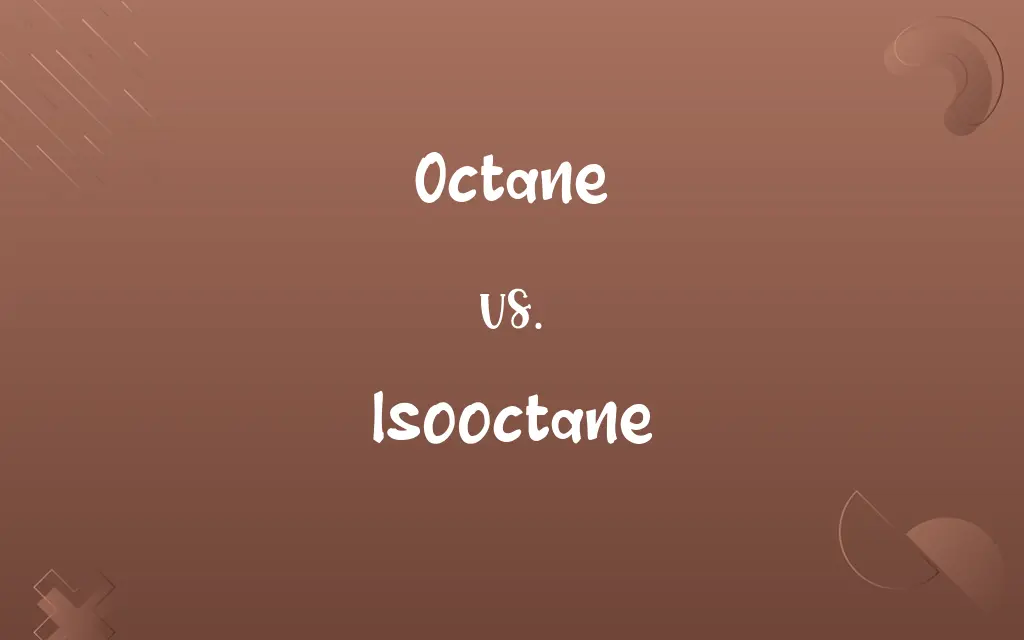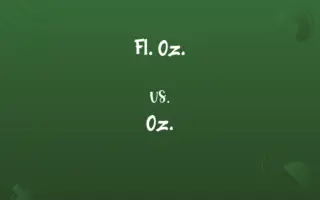Octane vs. Isooctane: Know the Difference

By Shumaila Saeed || Updated on December 26, 2023
Octane is a hydrocarbon with the formula C8H18, used as a component in gasoline, whereas isooctane, a specific isomer of octane, is used as a standard in measuring fuel octane ratings.

Key Differences
Octane is a hydrocarbon with a straight or branched chain, comprising eight carbon atoms. Isooctane, specifically 2,2,4-trimethylpentane, is a highly branched isomer of octane, used as a reference standard in fuel ratings.
Shumaila Saeed
Dec 26, 2023
While octane is a general term for C8H18 compounds in gasoline, isooctane's role is more specific as a benchmark for anti-knock properties in fuel.
Shumaila Saeed
Dec 26, 2023
In the octane rating system, isooctane represents the high standard (100 rating) due to its resistance to knocking. Octane, in its various forms, contributes to the overall octane rating of gasoline.
Shumaila Saeed
Dec 26, 2023
Different isomers of octane have varied physical properties like boiling points and densities. Isooctane is selected for its optimal properties that make it suitable as a standard in fuel testing.
Shumaila Saeed
Dec 26, 2023
Octane is a broader term, encompassing various isomers found in gasoline. Isooctane’s use is more specialized, primarily in the context of fuel quality assessment.
Shumaila Saeed
Dec 26, 2023
ADVERTISEMENT
Comparison Chart
Chemical Structure
Eight carbon hydrocarbon, various structures
Specific isomer, 2,2,4-trimethylpentane
Shumaila Saeed
Dec 26, 2023
Octane Ratings
Contributes to gasoline's rating
Standard for 100 in octane rating
Shumaila Saeed
Dec 26, 2023
Physical Properties
Varies among isomers
Selected for optimal anti-knock properties
Shumaila Saeed
Dec 26, 2023
ADVERTISEMENT
Octane and Isooctane Definitions
Octane
A hydrocarbon with eight carbon atoms, used in gasoline.
The refinery processes crude oil to extract octane for fuel.
Shumaila Saeed
Dec 26, 2023
Isooctane
A specific isomer of octane used in fuel rating systems.
Isooctane is the standard for measuring gasoline's octane rating.
Shumaila Saeed
Dec 26, 2023
Octane
An organic compound in various structural forms.
The octane content in gasoline affects its combustion quality.
Shumaila Saeed
Dec 26, 2023
Isooctane
Known chemically as 2,2,4-trimethylpentane.
Isooctane’s structure makes it resistant to engine knocking.
Shumaila Saeed
Dec 26, 2023
Octane
A key component in petrol, influencing its combustion.
Higher octane fuels can improve engine performance.
Shumaila Saeed
Dec 26, 2023
ADVERTISEMENT
Isooctane
Represents the ideal in gasoline's anti-knock quality.
Gasoline is rated based on how it performs relative to isooctane.
Shumaila Saeed
Dec 26, 2023
Octane
A term used to denote gasoline's combustive quality.
Cars with high-performance engines require high-octane fuel.
Shumaila Saeed
Dec 26, 2023
Isooctane
Used in determining the octane number of fuels.
The octane number indicates how much the fuel resembles isooctane in performance.
Shumaila Saeed
Dec 26, 2023
Octane
Any of various isomeric alkanes with the formula C8H18, found in petroleum and used as a fuel and solvent.
Shumaila Saeed
Oct 19, 2023
Isooctane
A benchmark compound for fuel quality assessment.
The fuel's resistance to knocking is compared to that of isooctane.
Shumaila Saeed
Dec 26, 2023
Isooctane
A flammable liquid hydrocarbon, C8H18, having a highly branched structure and used as a solvent and to determine the octane ratings of fuels.
Shumaila Saeed
Oct 19, 2023
Octane
(organic compound) Any of the eighteen isomeric aliphatic hydrocarbons (C8H18) found in petroleum, especially an iso-octane 2,2,4 trimethyl-pentane; they are used as fuels and solvents.
Shumaila Saeed
Oct 19, 2023
Isooctane
(organic compound) any isomer of n-octane; especially 2,2,4-trimethylpentane, used as a reference in the determination of the octane number of fuel
Shumaila Saeed
Oct 19, 2023
Octane
Any one of a group of metametric hydrocarbons (C8H18) of the methane (paraffin) series. The most important is a colorless, volatile, inflammable liquid, found in petroleum, and a constituent of gasoline or ligroin.
Shumaila Saeed
Oct 19, 2023
Octane
Any isomeric saturated hydrocarbon found in petroleum and used as a fuel and solvent
Shumaila Saeed
Oct 19, 2023
Octane
One of the primary constituents in automotive fuels.
Octane levels in fuel are critical for preventing engine knocking.
Shumaila Saeed
Dec 26, 2023
Repeatedly Asked Queries
Why is isooctane important in fuels?
Isooctane serves as a standard for measuring the anti-knock properties of fuel.
Shumaila Saeed
Dec 26, 2023
Do all octane isomers have the same properties?
No, different isomers of octane have varying physical and chemical properties.
Shumaila Saeed
Dec 26, 2023
Does octane directly relate to fuel efficiency?
Not necessarily; it relates more to fuel's combustion quality and engine compatibility.
Shumaila Saeed
Dec 26, 2023
Is isooctane better than other octane forms?
Isooctane is preferred in fuel ratings for its high resistance to engine knocking.
Shumaila Saeed
Dec 26, 2023
Are octane and isooctane both flammable?
Yes, they are both flammable and important for fuel combustion.
Shumaila Saeed
Dec 26, 2023
Why was isooctane chosen as the standard in octane ratings?
Due to its optimal anti-knock properties and stable combustion.
Shumaila Saeed
Dec 26, 2023
What is octane primarily used for?
Octane is a key component in gasoline, affecting its combustion quality.
Shumaila Saeed
Dec 26, 2023
Can octane levels affect engine performance?
Yes, higher octane fuels can improve performance and reduce knocking.
Shumaila Saeed
Dec 26, 2023
Is isooctane naturally found in gasoline?
Isooctane is not naturally occurring but is added to enhance fuel quality.
Shumaila Saeed
Dec 26, 2023
Is isooctane used in all types of gasoline?
It is used as a reference in formulating various types of gasoline.
Shumaila Saeed
Dec 26, 2023
How does octane affect a car's engine?
Higher octane fuel can prevent knocking, prolonging engine life.
Shumaila Saeed
Dec 26, 2023
Can isooctane be used alone as a fuel?
While theoretically possible, it is primarily used as a component in blended fuels.
Shumaila Saeed
Dec 26, 2023
Can octane levels vary in different types of gasoline?
Yes, premium and regular gasoline have different octane levels.
Shumaila Saeed
Dec 26, 2023
How is the octane number calculated?
It's calculated based on a fuel's performance compared to a mix of isooctane and heptane.
Shumaila Saeed
Dec 26, 2023
Can using the wrong octane damage an engine?
Using lower than recommended octane can cause knocking, potentially damaging the engine.
Shumaila Saeed
Dec 26, 2023
Are octane and isooctane toxic?
As with many hydrocarbons, they can be toxic and should be handled with care.
Shumaila Saeed
Dec 26, 2023
Can the octane rating influence fuel price?
Generally, higher octane ratings correspond to higher fuel prices.
Shumaila Saeed
Dec 26, 2023
Does isooctane have any environmental impacts?
Like other hydrocarbons, isooctane combustion can impact the environment.
Shumaila Saeed
Dec 26, 2023
Is octane used in diesel engines?
No, diesel engines use cetane, not octane, as their performance measure.
Shumaila Saeed
Dec 26, 2023
Does isooctane have any other uses besides fuel rating?
Its primary use is in the fuel industry as a standard for octane ratings.
Shumaila Saeed
Dec 26, 2023
Share this page
Link for your blog / website
HTML
Link to share via messenger
About Author
Written by
Shumaila SaeedShumaila Saeed, an expert content creator with 6 years of experience, specializes in distilling complex topics into easily digestible comparisons, shining a light on the nuances that both inform and educate readers with clarity and accuracy.






























































